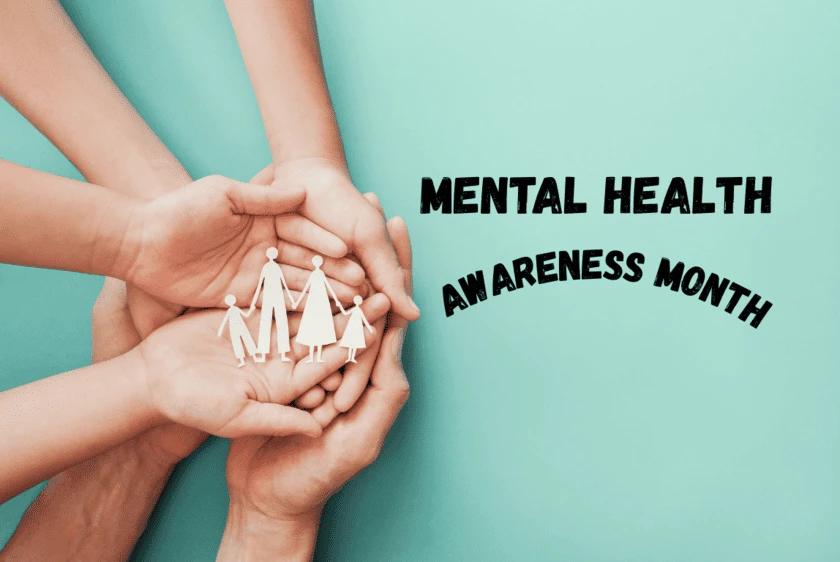Introduction
Mental Health Awareness Month: An Invitation to Reflection and Care is celebrated in May, with the goal of fostering open conversations about mental health and emotional well-being. Established by Mental Health America in 1949, this campaign aims to combat stigma and provide access to psychological support resources. Additionally, it increases visibility for mental health disorders and highlights the importance of quality services. This article explores the significance of this month and offers paths to support those in need.
The Importance of Mental Health Awareness
During May, society shifts its focus toward mental health, acknowledging its direct connection to overall well-being. Studies indicate that 1 in 5 adults in the United States experiences some form of mental disorder annually, including anxiety and depression. However, stigma still prevents many individuals from seeking professional treatment. Additionally, the lack of dialogue reinforces invisible barriers and delays essential diagnoses. Promoting honest discussions helps normalize this critical issue.

Most Affected Groups
Certain populations face greater challenges when it comes to mental health. For instance, women have higher rates of mood and anxiety disorders. Additionally, young adults aged 18 to 25 are particularly vulnerable to emotional crises and depressive episodes. Furthermore, LGBTQ+ communities and racial minorities struggle with prejudice and reduced access to mental health services. Mental Health Awareness Month emphasizes inclusive policies aimed at supporting these groups.
Signs of Emotional Distress and When to Seek Help
Many people experience occasional stress, but persistent symptoms may indicate a mental disorder. Watch for constant mood swings or unexplained irritability. Additionally, difficulty concentrating and sleep disturbances can serve as warning signs. Losing interest in previously enjoyed activities may also suggest depression. If these symptoms persist for weeks, seeking professional support for assessment and treatment is essential.
Depression: Symptoms, Impact, and Contributing Factors
The topic of Depression: Symptoms, Impact, and Contributing Factors extends beyond simple sadness and describes a mood disorder that affects emotions, thoughts, and the body for at least two weeks. Individuals struggling with this condition often experience a persistent sense of emptiness, irritation, and loss of interest in activities they once enjoyed. Additionally, changes in appetite, sleep, and energy levels frequently accompany depression. Understanding these symptoms is the first step toward seeking adequate treatment.
Key Symptoms
- Persistent feelings of emptiness and deep discouragement.
- Constant irritability, even without clear triggers.
- Loss of interest in hobbies and social interactions.
- Unexplained fluctuations in sleep and appetite.
- Difficulty concentrating and daily fatigue.
- Negative thoughts, excessive guilt, and, in severe cases, suicidal ideation.
Contributing Factors and Differential Diagnosis
Depression is not always solely caused by emotional factors. Additionally, the use of medication, alcohol, or drugs can trigger similar symptoms. Chronic illnesses, such as persistent pain and thyroid disorders, should also be examined by medical professionals. Distinguishing prolonged grief from clinical depression is crucial for an effective treatment plan. Therefore, an accurate diagnosis requires a multidisciplinary assessment.
Impact on Daily Life
Depression can negatively affect relationships, productivity at work or school, and lead to social isolation. Furthermore, stress and anxiety often coexist with depression, exacerbating feelings of being overwhelmed. Consequently, self-care becomes neglected, reinforcing the cycle of depression. Seeking therapy and social support is essential for regaining balance.
Treatment Options and Available Resources
In the United States, several approaches exist to treat mental disorders, ranging from therapy to medical interventions. Below are four essential treatment paths:
Lifestyle Changes: Engaging in physical exercise, meditation, and maintaining a balanced diet can significantly enhance mental health.
Cognitive Behavioral Therapy (CBT): Helps reframe negative thought patterns and develop coping skills.
Support Groups: Sharing experiences can strengthen connections and reduce feelings of isolation.
Psychiatric Medication: For moderate to severe cases, antidepressants and anxiolytics help regulate brain chemistry.
Additionally, online platforms offer affordable consultations, while community networks provide trained volunteers. Regardless of location, there are accessible resources to support individuals seeking help.
What Are Intrusive Thoughts?
Intrusive thoughts occur involuntarily and can cause intense distress. They are commonly experienced even by people without diagnosed disorders, but can also be present in cases of Obsessive-Compulsive Disorder (OCD) and heightened anxiety. These thoughts do not reflect actual desires—they are a mechanism of the mind processing fears and insecurities. Learning to recognize and demystify them is vital.
Common Types of Intrusive Thoughts
Violent Thoughts: Imagery or impulses of harming oneself or others, without actual intent.
Unwanted Sexual Thoughts: Ideas that conflict with personal values or identity, leading to guilt.
Excessive Self-Criticism: Internal voices reinforcing low self-esteem and fear of failure.
How to Cope with Intrusive Thoughts
First, accept that these thoughts are temporary and do not define you. Practicing mindfulness techniques can help observe them without judgment. Additionally, CBT provides tools to restructure negative patterns. Keeping a thought journal can reveal triggers and improve self-awareness. Most importantly, seeking professional guidance maximizes long-term results.
Conclusion
Mental Health Awareness Month reminds us that prioritizing emotional well-being is an act of courage and self-care. Each open conversation helps dismantle stigma and supports those suffering in silence. If you or someone you know is facing challenges, do not hesitate to seek professional help. Together, we can build a more empathetic and mentally healthy society. 💙
Scientific reference: National Institute of Mental Health. (2024, September). Mental Illness. National Institute of Mental Health; National Institute of Mental Health. https://www.nimh.nih.gov/health/statistics/mental-illness
- How do you treat mental illness? (n.d.). MHA Screening. https://screening.mhanational.org/content/how-do-you-treat-mental-illness




























